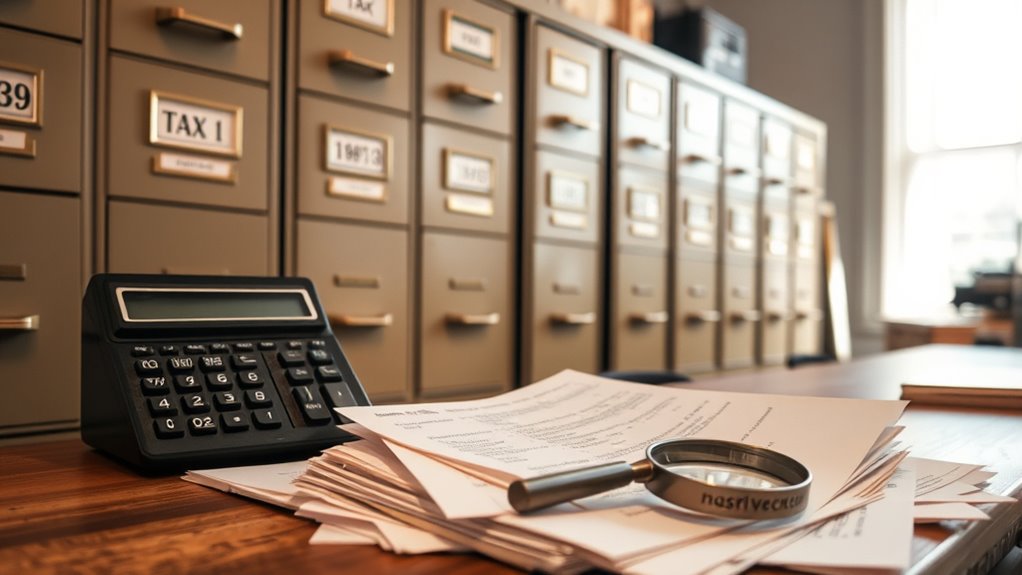You should keep your tax records for at least 3-7 years, with digital copies making storage easier. Bank statements, canceled checks, and deposit slips should stay for at least 1 year, or up to 3 years if reconciling accounts. Insurance policies and claims are best maintained for 3-5 years after coverage ends. Staying compliant means understanding varying legal requirements, and managing your documents securely ensures smooth handling of audits or disputes. If you continue, you’ll learn more about best practices for keeping your records organized and protected.
Key Takeaways
- Keep tax records for at least 3 years, up to 7 years if audits or deductions are possible.
- Maintain banking statements and checks for a minimum of 1 year, up to 3 years for reconciliation.
- Retain insurance policies and claims for 3-5 years after coverage ends.
- Regularly review and update retention schedules to ensure compliance with legal requirements.
- Use secure digital archives for efficient storage, quick access, and protection of sensitive documents.

Have you ever wondered how long you should keep important documents? It’s a common question, especially when it comes to managing your financial and legal records. The answer depends on the type of document, the purpose it serves, and regulations you need to follow. In today’s digital age, many people are shifting to digital archives, which makes storing and retrieving documents more efficient. However, it’s essential to understand the legal compliance requirements that govern how long you must retain certain records to avoid potential penalties or legal issues.
For tax records, it’s generally advised to keep copies of your filed returns, supporting documents, and related correspondence for at least three to seven years. The IRS recommends holding onto these records for at least three years from the date you filed your return or the due date of the return, whichever is later. If you suspect you might face an audit or need to substantiate deductions, keeping records for up to seven years provides an extra safety net. Digital archives make it easier to store these documents securely and access them quickly if needed, but you should verify that your digital storage methods comply with legal standards for data security and integrity.
Banking records, including statements, canceled checks, and deposit slips, should typically be kept for at least one year. However, if you’re reconciling accounts, handling disputes, or preparing for tax time, keeping these records for up to three years can be beneficial. Insurance records, such as policies, claims, and proof of coverage, should be retained for the duration of the policy plus several years afterward—often around three to five years—to cover any claims or disputes that might arise after the policy ends. Additionally, understanding juice cleansing practices can help you make healthier choices for managing your wellness, which is relevant if you’re considering lifestyle changes that may impact your financial health.
It’s vital to understand that legal compliance plays a big role in determining your retention periods. Different jurisdictions or specific industries may have regulations dictating longer or shorter retention times. Using digital archives can help streamline this process, but only if you implement proper security measures to protect sensitive information. Regularly reviewing and updating your document retention schedule ensures you’re not holding onto records longer than necessary, reducing clutter and potential liability. Ultimately, staying organized and aware of legal requirements helps you avoid unnecessary risks and ensures you’re prepared for any audits, disputes, or legal proceedings that might come your way.
Frequently Asked Questions
Are Digital Records as Valid as Paper Documents for Tax Purposes?
Yes, digital records are as valid as paper documents for tax purposes if you use secure methods like digital signatures and cloud storage. These tools guarantee your records are authentic, unaltered, and easily accessible when needed. Just make sure to keep backups and follow proper electronic recordkeeping standards. This way, your digital documents hold the same legal weight as traditional paper files, making your tax documentation reliable and compliant.
How Should I Store and Organize My Retained Documents?
Did you know that organized files can save you hours when locating important documents? To store and organize your retained documents effectively, use clear labels and logical categories for both paper and digital storage. For digital storage, create folders with descriptive names and back up regularly. Keep physical files in a filing cabinet or secure location, and consider digitizing older records to save space and enhance accessibility.
What Are the Penalties for Improper Document Retention?
If you fail to meet proper document retention standards, you could face legal repercussions, including fines or penalties for non-compliance with regulations. The IRS or other authorities may scrutinize your records, leading to audits or legal actions. To avoid these issues, make certain you follow compliance requirements diligently. Proper retention helps protect you legally and financially, and keeps you prepared for any audits or investigations.
Do Inheritance or Estate Records Require the Same Retention Periods?
Inheritance or estate records typically need to be kept for at least 7 years, similar to tax and financial documents. Did you know that 60% of estate disputes involve missing or incomplete inheritance documentation? Properly maintaining estate planning and inheritance records guarantees you meet legal requirements and protects your loved ones. You should retain estate-related documents long enough to cover potential audits, disputes, or claims, often aligning with the 7-year period.
How Do International Records Retention Laws Differ From U.S. Standards?
International record standards often differ from U.S. standards due to varying cross border compliance requirements. You need to understand each country’s laws, as some nations mandate longer retention periods for certain documents, while others may have more relaxed rules. Staying compliant involves researching international record retention laws, ensuring your records meet cross border compliance, and adjusting your document retention practices accordingly. This proactive approach helps you avoid legal issues and maintains good international business practices.
Conclusion
Remember, your records are the roots of your financial tree. Keep them healthy and well-tended by knowing how long to hold onto tax, banking, and insurance documents. Let them be the sturdy trunk supporting your financial future, not the fallen leaves of forgotten papers. When you stay vigilant and organized, you’re watering the seeds of peace of mind and growth. So, clear out the old to make space for new opportunities to blossom.









